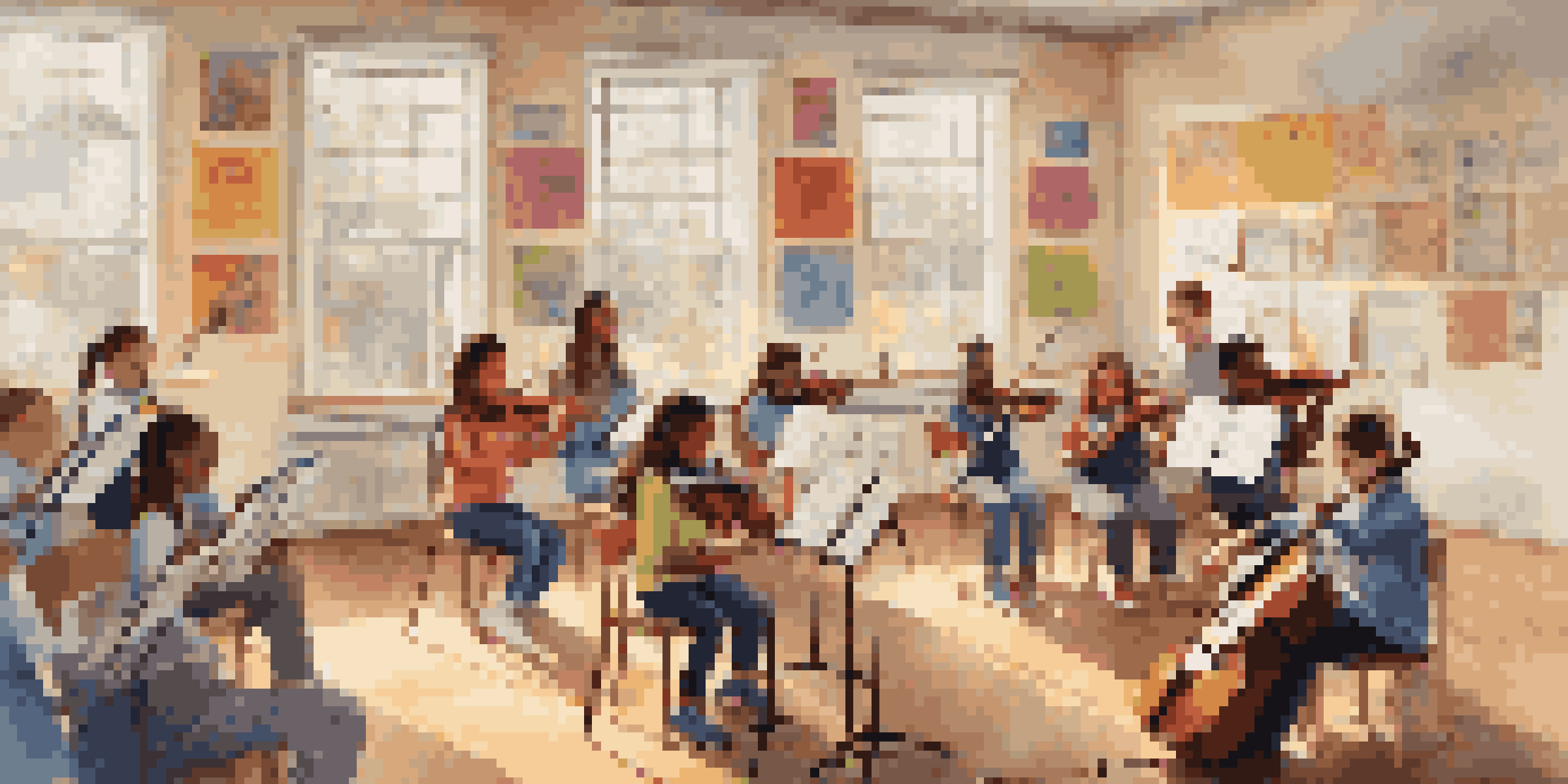The Importance of Music Education in Shaping Personal Values

Music Education: A Foundation for Personal Development
Music education serves as a cornerstone for personal growth, nurturing creativity and discipline in students. By engaging with music, individuals learn to express themselves and develop a deeper understanding of their emotions. This foundation not only enhances artistic skills but also builds a solid base for various life skills that are essential in personal and professional settings.
Music can change the world because it can change people.
For instance, the process of learning an instrument requires patience and perseverance, traits that are invaluable in any aspect of life. Students often find themselves setting goals, such as mastering a difficult piece, which fosters a sense of achievement and boosts their confidence. This journey of self-improvement through music can ripple into other areas, encouraging a mindset geared towards continuous learning and growth.
Moreover, the collaborative nature of music education, whether in bands or choirs, teaches students the importance of teamwork and communication. Working towards a common goal helps instill values of respect and understanding for others, which are critical in forming healthy relationships both in and out of the classroom.
Cultivating Empathy Through Musical Expression
One of the profound impacts of music education is its ability to cultivate empathy among students. Engaging with diverse musical styles and cultures enables learners to appreciate different perspectives and experiences. This exposure fosters an understanding of the world beyond their immediate surroundings, enriching their emotional intelligence.

For example, when students perform pieces from various cultures, they not only learn about the music but also the stories and emotions behind it. This connection encourages them to step into others' shoes, enhancing their capacity for compassion and kindness in everyday interactions. The ability to empathize with others is a key personal value that translates into more meaningful relationships.
Music Education Boosts Personal Growth
Engaging with music nurtures creativity, discipline, and essential life skills that contribute to personal and professional development.
Furthermore, music often addresses themes of struggle, joy, and resilience, providing students with a powerful medium to explore complex emotions. By relating to the emotions conveyed in music, students learn to express their feelings more openly, which can lead to greater self-awareness and emotional regulation.
Building Resilience and Discipline in Students
The journey of music education is often filled with challenges that require resilience and discipline. Learning to play an instrument or read music doesn't happen overnight; it demands consistent practice and dedication. This commitment to improvement instills a strong work ethic that students carry into other areas of their lives.
The beautiful thing about learning is that no one can take it away from you.
As students face obstacles, such as struggling to master a specific technique, they learn the importance of perseverance. Overcoming these hurdles not only boosts their musical abilities but also reinforces the idea that hard work pays off, a valuable lesson applicable in academics and future careers. This resilience becomes a vital personal value that helps them navigate life's challenges with confidence.
Additionally, the discipline learned through music extends beyond practice hours. Students understand the importance of setting aside time for practice, managing their schedules, and prioritizing their commitments. These skills foster a sense of responsibility that is crucial as they transition into adulthood.
Enhancing Creativity and Critical Thinking Skills
Music education is a powerful catalyst for enhancing creativity and critical thinking skills. By encouraging students to compose, improvise, and interpret music, they develop a unique way of thinking that is both imaginative and analytical. This creative mindset is invaluable in an increasingly complex world where innovation and problem-solving are in high demand.
For instance, when students compose their own music, they must make decisions about melody, harmony, and rhythm, which requires critical thinking. They learn to evaluate their choices and explore various possibilities, honing their ability to think outside the box. This skill set is not only applicable to music but can also enhance their approach to challenges in science, mathematics, and the arts.
Empathy Through Musical Engagement
Exposure to diverse musical styles fosters empathy, helping students appreciate different perspectives and enhancing their emotional intelligence.
Moreover, music education promotes a sense of experimentation, allowing students to take risks without fear of failure. This environment of exploration nurtures their creativity, empowering them to express their individuality and develop unique perspectives that contribute positively to society.
Fostering Cultural Awareness and Appreciation
Through music education, students gain exposure to a multitude of cultures, fostering cultural awareness and appreciation. Learning about various musical traditions allows students to understand and respect the diversity that exists within their communities and the world. This awareness is essential in today's interconnected society, where collaboration across cultures is increasingly common.
For example, when students study the music of different cultures, they not only learn about the sounds and instruments but also the historical and social contexts behind them. This knowledge deepens their understanding of global issues and celebrates the richness of human expression. Such experiences promote inclusivity and empathy, values that are vital for harmonious coexistence.
Additionally, participating in multicultural music events or festivals can further enrich students' appreciation for diversity. These experiences allow them to engage with peers from different backgrounds, enhancing their social skills and building lasting friendships rooted in shared interests.
Boosting Confidence and Self-Esteem Through Performance
Performing music, whether in front of a small group or a larger audience, is a powerful way to boost students' confidence and self-esteem. The experience of showcasing their talents fosters a sense of accomplishment and pride, reinforcing their belief in their abilities. This newfound confidence can permeate other areas of their lives, encouraging them to take on challenges with an optimistic outlook.
For instance, preparing for a concert or recital teaches students the importance of preparation and practice. The culmination of their hard work is evident when they take the stage, and the positive feedback they receive further validates their efforts. This cycle of preparation and performance cultivates a growth mindset, where students learn to view challenges as opportunities for growth.
Building Resilience and Confidence
The challenges of learning music instill resilience and confidence, equipping students with a strong work ethic and a positive mindset for life's challenges.
Moreover, the support and encouragement from peers, educators, and family during performances create a nurturing environment that enhances self-worth. Such experiences teach students that their contributions matter, solidifying personal values related to self-acceptance and resilience.
Encouraging Lifelong Learning and Appreciation for Music
Music education instills a love for music that can lead to lifelong learning and appreciation. When students are exposed to various musical genres and styles, they develop a curiosity that encourages them to explore music beyond the classroom. This exploration often translates into a deeper understanding of music's role in culture and society.
For example, students who learn about classical music may be inspired to attend concerts, listen to different composers, or even pursue further studies in music. This ongoing engagement fosters a sense of belonging within the larger music community, enriching their lives in countless ways. The values of curiosity and exploration become ingrained, encouraging them to seek knowledge in various fields.

Additionally, this appreciation for music can enhance their social interactions, as they bond with others over shared musical interests. Whether discussing favorite artists or attending live performances, the connections made through music become a meaningful aspect of their lives, reinforcing the importance of community and shared experiences.